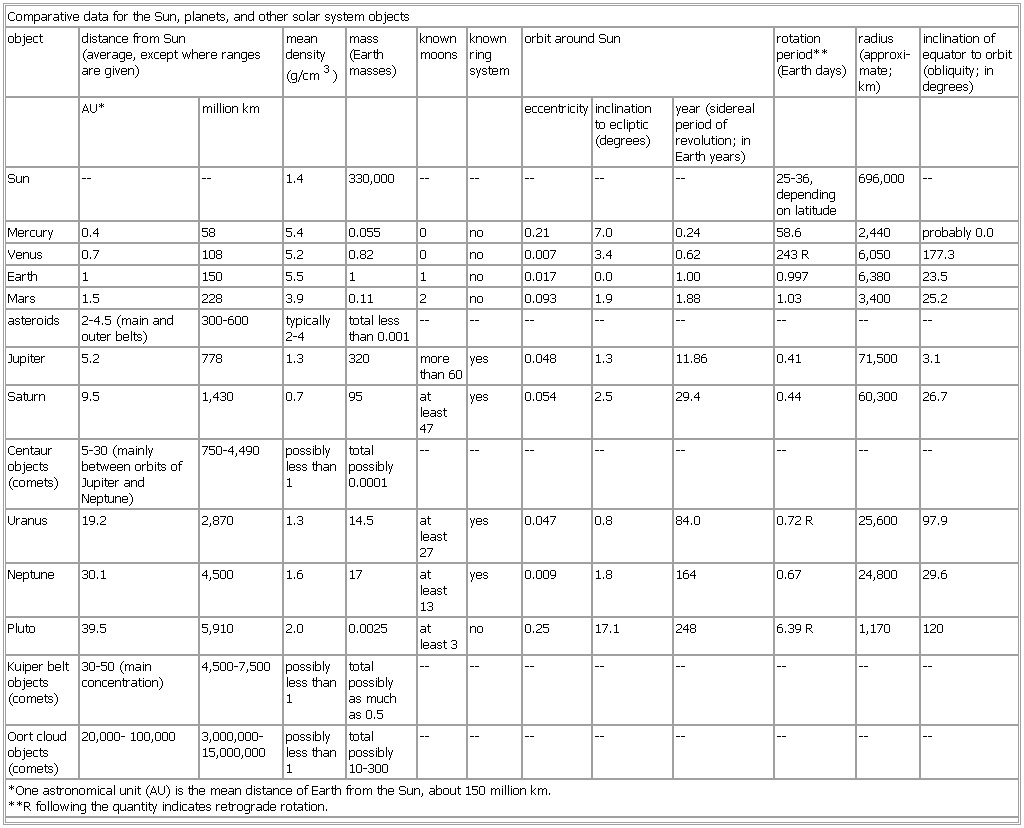Comparative data for the Sun, planets, and other solar system objects
- Comparative data for the Sun, planets, and other solar system objects
-
Comparative data for the Sun, planets, and other solar system objects
object distance from Sun
(
average, except where ranges are given) mean density (g/cm
3) mass (
Earthmasses) known moons known ring system orbit around Sun rotation period** (Earth days) radius (approxi-
mate; km) inclination of equator to orbit (
obliquity; in degrees)
AU* million km eccentricity inclination to ecliptic (degrees) year (sidereal period of revolution; in Earth years)
Sun — — 1.4 330,000 — — — — — 25-36, depending on latitude 696,000 —
Mercury 0.4 58 5.4 0.055 0 no 0.21 7.0 0.24 58.6 2,440 probably 0.0
Venus 0.7 108 5.2 0.82 0 no 0.007 3.4 0.62 243 R 6,050 177.3
Earth 1 150 5.5 1 1 no 0.017 0.0 1.00 0.997 6,380 23.5
Mars 1.5 228 3.9 0.11 2 no 0.093 1.9 1.88 1.03 3,400 25.2
asteroids (
asteroid) 2-4.5 (main and outer belts) 300-600 typically
2-4 total less than 0.001 — — — — — — — —
Jupiter 5.2 778 1.3 320 more than 60 yes 0.048 1.3 11.86 0.41 71,500 3.1
Saturn 9.5 1,430 0.7 95 at least 47 yes 0.054 2.5 29.4 0.44 60,300 26.7
Centaur objects (
Centaur object) (comets) 5-30 (mainly between orbits of Jupiter and Neptune) 750-4,490 possibly less than 1 total possibly 0.0001 — — — — — — — —
Uranus 19.2 2,870 1.3 14.5 at least 27 yes 0.047 0.8 84.0 0.72 R 25,600 97.9
Neptune 30.1 4,500 1.6 17 at least 13 yes 0.009 1.8 164 0.67 24,800 29.6
Pluto 39.5 5,910 2.0 0.0025 at least 3 no 0.25 17.1 248 6.39 R 1,170 120
Kuiper belt objects (comets) 30-50 (main concentration) 4,500-7,500 possibly less than 1 total possibly as much as 0.5 — — — — — — — —
Oort cloud objects (comets) 20,000- 100,000 3,000,000- 15,000,000 possibly less than 1 total possibly 10-300 — — — — — — — —
*One astronomical unit (
AU) is the mean distance of Earth from the Sun, about 150 million km.
**R following the quantity indicates retrograde rotation.
See as table:
* * *
Universalium.
2010.
Look at other dictionaries:
solar system — the sun together with all the planets and other bodies that revolve around it. [1695 1705] * * * The Sun, its planets, and the small bodies (see asteroid, Centaur object, comet, Kuiper belt, meteorite, and Oort cloud) interplanetary dust and gas… … Universalium
Solar System — This article is about the Sun and its planetary system. For other systems, see planetary system and star system. For a list of physical and orbital statistics for the Solar System s largest bodies, see List of gravitationally rounded objects of… … Wikipedia
astronomical unit — Astron. a unit of length, equal to the mean distance of the earth from the sun: approximately 93 million miles (150 million km). Abbr.: AU [1900 05] * * * ▪ unit of measurement Comparative data for the Sun, planets, and other solar system… … Universalium
Sun — This article is about the star. For other uses, see Sun (disambiguation). The Sun … Wikipedia
History of the Earth — For the history of modern humans, see History of the world. Geological time put in a diagram called a geological clock, showing the relative lengths of the eons of the Earth s history The history of the Earth describes the most important events… … Wikipedia
space exploration — Investigation of the universe beyond Earth s atmosphere by means of manned and unmanned spacecraft. Study of the use of rockets for spaceflight began early in the 20th century. Germany s research on rocket propulsion in the 1930s led to… … Universalium
Colonization of the Moon — Lunar outpost redirects here. For NASA s plan to construct an outpost between 2012 and 2024, see Lunar outpost (NASA). Moonbase redirects here. For other uses, see Moonbase (disambiguation). 1986 artist concept The colonization of the Moon is the … Wikipedia
Orbit of the Moon — Not to be confused with Lunar orbit in the sense of a selenocentric orbit, that is, an orbit around the Moon The Moon completes its orbit around the Earth in approximately 27.3 days (a sidereal month). The Earth and Moon orbit about their… … Wikipedia
Neptune — This article is about the planet. For other uses, see Neptune (disambiguation). Neptune … Wikipedia
Planet — This article is about the astronomical object. For other uses, see Planet (disambiguation) … Wikipedia

